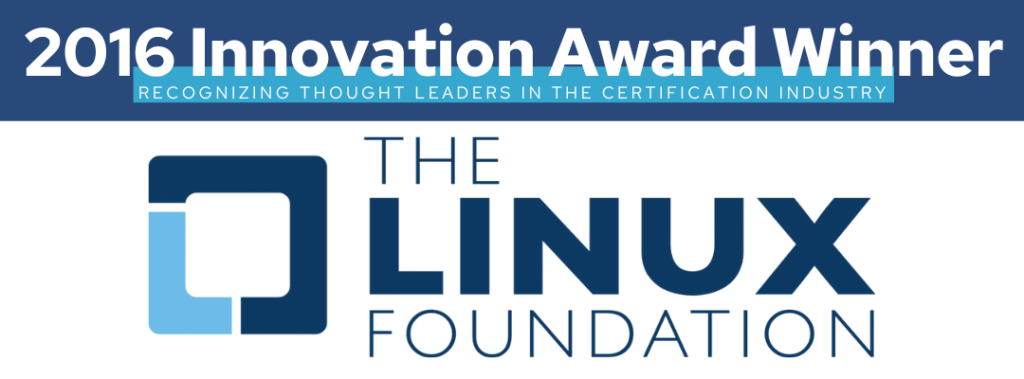
The Information Technology Certification Council (ITCC) is now reviewing submissions for its ninth annual Innovation Award – an award recognizing leadership initiatives that have positively impacted the IT certification industry or your company.
We’d like to highlight some of the award’s past winners and share how the award changed things for their organization. In today’s blog, we’re catching up with 2016 Innovation Award Winner, Linux Foundation, who developed an innovative platform for proctored, performance-based certification that is available online.
The secure remote testing platform improves the security of online exams and facilitates communication between test administration officials and exam candidates. The aim of the team that developed the platform was twofold: The developers wanted to improve access to testing for exam candidates in far-flung locales, but also improve both the caliber of the exams and the level of exam security.
Keep reading to hear from Clyde Seepersad, SVP and General Manager, Training & Certification, Linux Foundation.
How has winning the award helped you/your organization within ITCC or the industry? Has it opened any doors or created opportunities/connections?
The Linux Foundation’s Training & Certification team was honored to receive the 2016 Innovation Award from the ITCC. Our internal team was humbled by the recognition received within the Linux Foundation and across the industry. The recognition of our performance-based, online certifications generated demand for our exams by individuals and organizations across the world and has continued to be the gold standard in our open-source community.
How has winning the award helped your team within your organization?
Winning the award earned the Training & Certification team increased trust, respect, and recognition within our larger organization. An increased number of projects supported by the Linux Foundation were also interested in learning how we could partner together to create training courses and certification exams to support their communities.
What made your organization decide to apply for the Innovation Award?
At the time we created our new platform for proctored, performance-based, online exams, we knew it would be the future of demonstrating an individual’s knowledge and experience within our community. Others had created similar exams that could be taken in person at a physical location, but we needed to reach a global, online community. We continue to be very proud of our innovations and continue to strive to meet and exceed the needs of our community.
What was the hardest part of the application process and how did you get through it?
The hardest part of the process is simply making the time to think through how to tell the story of your innovation in a concise way. When you and your team have spent so much time developing, it’s often difficult to summarize the results without sharing too much about the process. You’re simply too close to it. You need to dedicate time to step back and look at the project strategically and how/why it makes a difference to others.
What advice do you have for others who are considering submitting an application? Any tips or insights to share?
Our advice is to take a chance. The more you write and submit an application, the more comfortable you will be with the process. You may also consider hiring a third-party writer in the tech space so that you can tell your complete story to them and then let them highlight the parts that will matter the most to others within the industry.
Learn more about the ITCC 2023 Innovation Award
To learn more about the ITCC Innovation Award, visit the 2023 Innovation Award page on the ITCC website for all the details. 2023 submissions are now being reviewed by the judging panel, and this year’s winner will be announced at the ITCC Spring Member Meeting in March.
